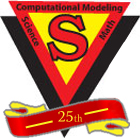

New Mexico Supercomputing Challenge
Supercomputing: Pushing the limits of "standard" computing du jour.
| About | Resources | Archive | Newsflash |
Guidelines for Selecting a ProjectWhen choosing a project for the Challenge, one of the most important considerations is that it be something that can be done in the short time of the program. Projects are judged on overall quality and by the progress made by the team during the competition year. It is important to submit a project that is complete. It is also important to choose a project in which you have a genuine interest. When examining projects, the judges consider the scientific content; the effectiveness of the computational approach; the creativity, innovation, and initiative shown in developing and carrying out the project; and the clarity of the presentation of the work. For more information about guidelines for the projects, please see http://www.supercomputingchallenge.org/about/guidelines.shtml See also the list of Areas of Science Appropriate for Challenge Projects. http://www.supercomputingchallenge.org/about/areas.shtml
Project Requirements and RestrictionsThe following rules apply to all projects for the Challenge:
Software submitted during the course of the Challenge competition will be the exclusive property of each participant. Each participant does grant the sponsoring organizations a nonexclusive right to reproduce, modify, use, display, and distribute such software and other material which they submit. |
